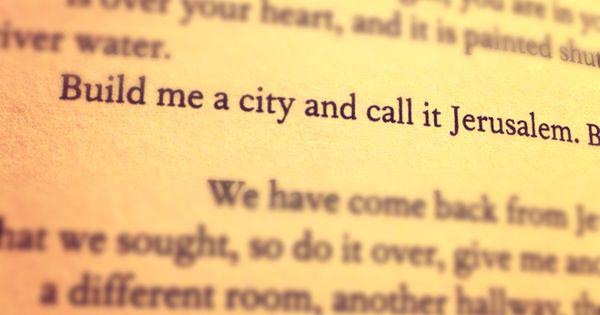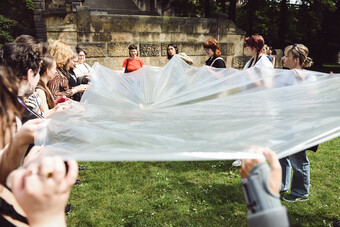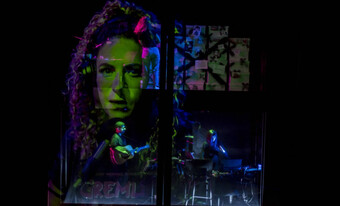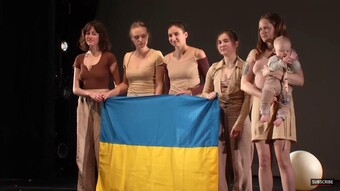A Litany of Multiple Voices
Notes on Political Theater
This three-part series chronicles the musings of a twenty-something college grad making theater in London, trying to figure out what to bring home.
To begin this particular musing it is important to say something up front: I am the sort of person who believes that the things I read are written just for me, that they are speaking to me in specific moments of my life. Most recently, I’ve become fixated on a poem by a man named Richard Siken entitled A Litany in Which Certain Things Are Crossed Out. I like its disjointed storytelling and its strong voice, but I also love it for the moment that it entered my life.
As a recent graduate, I feel very acutely that I am living, for the first time, in a bubble of my own experiences. In college, when the real world is still entirely hypothetical, it is possible to experience that world through the TV shows you watch, or the Buzzfeed articles you are sent. It is possible to believe the very dangerous notion that “real life” is like Sex and the City, or Girls, as opposed to what it really is, something that is somewhere else entirely, entirely impossible to explain using, for example, 23 gifs of goats. At this precise moment, the concept of “unemployment” is becoming real to me in a way that it was not six months ago and it is a sobering reality.
At the same time, I feel like I’m understanding more and more what kind of art I respond to, how I define my own personal and artistic aesthetic. In this maelstrom of decisions a single phrase from this Siken’s poem stuck out to me: “Build me a city and call it Jerusalem. Build me another and call it//Jerusalem.” That line feels like the lens through which I am currently viewing most of my decisions and I have interpreted it to mean the following: Things are what we say they are. The only way to find the things we need is to try on different versions, to believe in them until we move on. To extrapolate to a wider context, life is littered with jobs and work and art and the only way to know whether or not those things offer the right way is to try them on, to believe in them until it is time to believe in something else.
Things are what we say they are. The only way to find the things we need is to try on different versions, to believe in them until we move on.
Last week I wrote about a show that I saw at the Edinburgh Fringe that has stuck with me, and the more I think about it the more it has nestled its way into my psyche. There seemed to me to be a beautiful raw power in the unrehearsed nature of it. I wasn’t watching something that was designed to blow me away with technical prowess or flawless design; I was watching a myriad of artists explain their personal reactions to a circumstance about which they cared.
Since my last post, I have realized another component of it that struck me: I wasn’t watching actors perform someone else’s writing, channeled through a third party director. I wasn’t watching a writer play devil’s advocate with themselves through characters and I wasn’t watching an actor recite lines they didn’t believe in the interest of “becoming” another human. I was watching artists of varying crafts take on the challenges of an unrehearsed performance, take full responsibility for their own work and presentation.
A commenter on my last piece asked an incredibly valid question about this community-response model: “If a piece only introduces a Babel of equal morally/ethically/spiritually ‘valid’ viewpoints, what's the difference between the show and turning on the cacophonous din of primetime cable news?” I’ve thought a lot about this question and the answer that I’ve come to is that it is more civil because it is more difficult. I am not interested in seeing who can yell their opinion the loudest while an infinite number of people yell their own only slightly different opinions. I am interested in a space where the work we make can be interrogated more actively, instead of being designed to be impossible to disagree with.
Sanford Meisner, the master of a form of Method acting, wrote that “acting is behaving truthfully under imaginary circumstances.” I have always loved this because truly, the most interesting theater to me has always been theater in which you can see the sweat. My friends and I admire theater that is “athletic,” theater in which part of what is compelling is watching real people handle strenuous situations, with no imagined artifice. A prime example of this that springs to mind is Romeo Castellucci’s piece at the 2008 Avignon Festival, “Inferno”. The piece is beautiful, not least because it focuses on the athleticism of its actors, on the physical possibilities of their bodies and the effort they exert. The emotional height is a long segment of an actor free-climbing the side of the Avignon palace, free of any sort of safety nets or harnesses. At the very top he drops a ball down and a child on the ground catches it. It is in some ways the perfect scene: an actor is presented with a challenge and through a range of techniques, and with impressive skill, he finds a way to conquer it. It literalizes dramatic tension and the stakes are totally real for the body of the actor. It is an actor behaving truthfully under an entirely real situation.
It is these sorts of pieces that inspire me when I think about political theater. Instead of setting up a scene in which these actors would be other people to explain their ideas, there is something incredibly interesting about forcing those performers to be themselves in front of the crowd, to speak without the protective bubble of a writer’s ideas or a director’s aesthetic. They are representing nothing but themselves, and in those performances there is a honesty that, in my opinion, even the most skillful acting cannot touch.
This is the medium in which I would love to see political theater approached, one in which actions and reactions are indicative of a real person’s viewpoint, and in which the discussions that we have are not abstracted through imagined people or scenarios.









Comments
The article is just the start of the conversation—we want to know what you think about this subject, too! HowlRound is a space for knowledge-sharing, and we welcome spirited, thoughtful, and on-topic dialogue. Find our full comments policy here